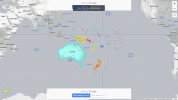Deleted member 200420
There are fourteen countries in Oceania: Australia, Papua New Guinea, New Zealand, Fiji, Solomon Islands, Micronesia, Vanuatu, Samoa, Kiribati, Tonga, Marshall Islands, Palau, Nauru, and Tuvalu. There are nine dependencies or territories: French Polynesia, New Caledonia, Guam, Northern Mariana Islands, American Samoa, Cook Islands, Wallis & Futuna, Niue, and Tokelau.
- Probably the first thing that needs to happen is that "Australasia" forms in 1901 meaning Australia, New Zealand, and Fiji would be united into one state.
- I think it would be relatively easy to change the status of the Cook Islands, Niue, and Tokelau into just being a part of this wider federation rather than being semi-independent to New Zealand like OTL. Other former British pacific territories (Vanuatu, Solomon Islands, Kiribati, Samoa, Tuvalu, could also probably be integrated.
- Avoiding America Samoa with an alternate Tripartite Convention would mean that American Samoa would be part of this Federation. Or perhaps all the American pacific territories (Guam, Northern Mariana Islands, American Samoa) could be given to Australasia during the Cold War for some reason? Same with the Marshall Islands.
- Nauru, Palau, and Micronesia could be administered following WWII by Australasia and eventually annexed.
- Some alternate British annexation of Tonga could see its monarchy abolished and eventually annexed into the Federation.
